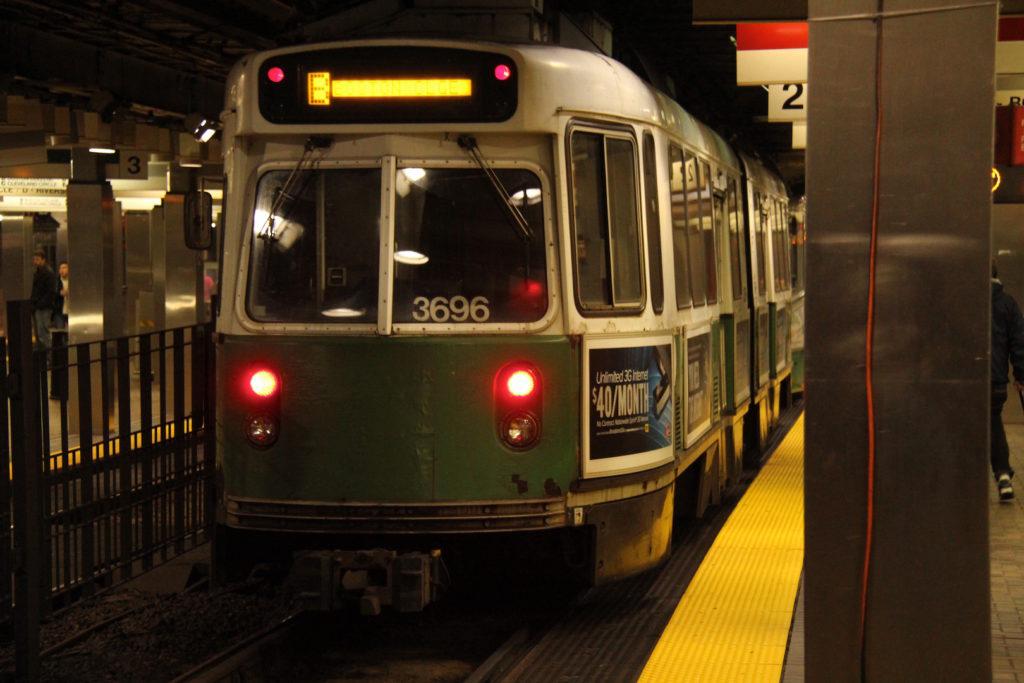By Rachel Morford, news staff
Fare changes for the Massachusetts Bay Transportation Authority (MBTA) proposed in March went into effect earlier this week, changing the cost of commuter services for the Boston T and bus systems.
While the majority of MBTA services experienced a fare increase, some costs were reduced; on average prices were increased 9.3 percent. The increases will generate an estimated $43 million in new revenue this upcoming year.
The price changes are to close the 2017 fiscal year budget deficit of roughly $242 million, according to MBTA spokesman Jason B. Johnson.
Many Northeastern University commuters voiced their frustrations about the city’s rising costs of public transportation.
“I hate it,” said Patrick Hayes, a junior finance major. “Every time after I refill with like a quick four dollars, it is out in like a second, you know what I mean?”
Vine Williams, a third-year criminal justice major, said that if the MBTA is charging higher prices, then it should be offering more for its commuters.
“I wish we would boycott it,” Williams said. “If they’re going to raise the prices, why don’t they expand the services? Offer 24-hour transportation, or something of that nature.”
Critics argued that the MBTA should crack down harder on fare evaders before raising prices for paying commuters. Students were quick to agree that sneaking onto the T, especially on the Green line, is a fairly common occurrence.
“It is very easy [to sneak onto a train],” said Charmille Dizon, a rising sophomore geology and physics student. “A lot of my friends do that. [Officials] don’t really notice when you get in. You can just jump in the back.”
But the problem has not gone unnoticed, according to the MBTA spokesman.
“The MBTA takes the issue of fare evasion very seriously,” Johnson said. “Earlier this year, the MBTA released a plan for combating Green Line fare evasion now and improving collections in the future.”
The MBTA’s proposed strategy, Johnson said, involves inspection teams and rear-door validators on vehicles, along with a real-time fare status notification system.
“These strategies are part of the MBTA’s ongoing efforts to improve our paying customer’s experience by demonstrating that the T is serious about collecting fares from all riders,” he said.
Johnson, like Northeastern student commuters, identified the Green Line as an easy target for fare evaders.
“Fare collection has always been a challenge on the Green Line, due to the desire to both collect fare, but at the same time move service along at a steady pace,” he said.
The MBTA has begun addressing these concerns by assigning officials to certain stations during peak hours and partnering with Transit Police, Johnson said.
While some commuters complained about the rise in costs, others wanted to know if the MBTA would invest new revenue back into the T.
“I mean, are they going to spend that money on the T?,” said Paula Cutrim, a Northeastern rising third-year neuroscience major. “Because if they are, then I don’t have a problem with it.”
A recent audit of the MBTA cash counting department in Charlestown (colloquially referred to as the “money room”) validated commuter fears, as it revealed a myriad of security lapses in the department. The hazards included a duct-taped vault door, unrestricted vault access, non-functional alarm contacts, mismanaged keys and no inspections for individuals entering or exiting the department, according to MBTA General Manager Brian Shortsleeve.
Shortsleeve corroborated the audit’s findings, stating the safety of the money room employees had been jeopardized by the lapses.
In the wake of the scandal, the MBTA underwent several changes. Four managers are no longer in their positions, and enhanced security is now being provided by an international security firm working in tandem with Transit Police, according to Shortsleeve.
“While the MBTA believes it has addressed any significant threats to security, a major investment would still be necessary to correct all of the problems identified,” he said in a statement. “I will continue to talk with the Fiscal and Management Control Board about whether handling cash is a business the T should even be in. Other transit systems and public and private operations across the country have procured the services of cash management professionals.”
In the midst of widespread negative feelings toward the MBTA, the transportation operator announced a contest for commuters to vote for the best tracking app for its services. The winning app will be announced in September, after which it will be officially endorsed by the T and prominently featured on the MBTA website for a full year, according to a Massachusetts Department of Transportation (MassDot) press release.
A public forum where developers can showcase their apps will be held on Aug. 12 at the State Transportation Building on Park Plaza in Boston, according to MassDot. The event will feature finalists from existing apps presently used by the public.
“Our customers are always on the go, and useful apps help connect riders to the information they need to improve their commutes,” said Shortsleeve. “We’re thoroughly excited to examine these innovative mobile tools and encourage travelers to log on and share their opinions of their favorite apps.”
File photo by news staff















